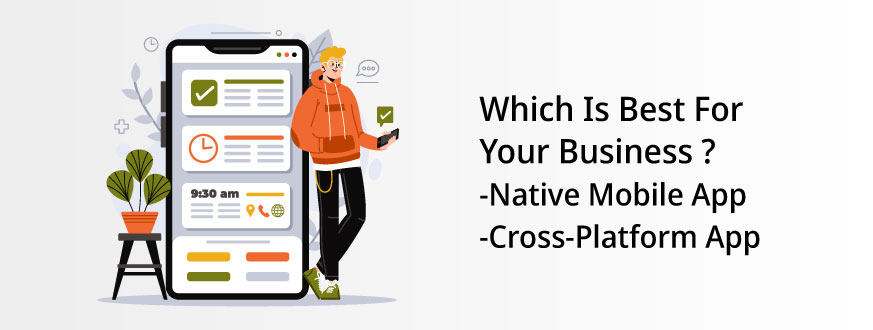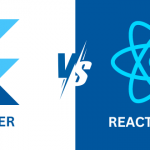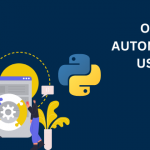Mobile application development is an important business activity. When you own a business and when you are eager to expand your presence to target markets and grow through every investment, you look for opportunities that will yield results. One such result yielding way is developing a mobile application for business augmentation.
“In 2026, consumers are projected to download 143 billion mobile apps from the Google Play Store, up by almost 30 percent from 111 billion apps downloaded in 2021. By comparison, consumers will amass approximately 38 billion downloads from the Apple App Store in 2026, an increase of around 15 percent compared to the number of downloads in 2021” says a report.
Businesses that choose to develop a mobile application should consult an expert mobile app development company and it is important for a successful process. The best app development company will guide entrepreneurs on what will work for their type of business.
Though there are Native app, Cross-Platform apps, Hybrid apps, and Progressive web apps that can help businesses in their endeavours, a perfect choice for the business augmentation can only be suggested by leading mobility solution providers in the industry.
Today we are going to discuss which app is better for business augmentation and growth, whether it is native mobile app or Cross-platform app? How much would it cost to develop a great business app as per the unique requisites?
When you clear the crucial part of finding the right tech partner to develop a business app, the second part is discussing your unique business idea and app development requirements. While doing that you will be guided by the technical partner about choosing the right platform, development method, tools, and frameworks, which suit your business requirement and budget the most.
In today’s discussion we will understand the pros and cons of developing native app and cross-platform app development and when to go to them and which to pick.
Native App development – A complete business system
The business owners must pick their app platform prudently analysing all the pros and cons of the platforms. If Native app development is the choice, then you have to decide on which to pick Android or iOS or to go for both.
“Google’s Android and Apple’s iOS combined represent 99% of the global mobile OS market, as per a Statista report.”
The native mobile app development can be opted when the business has a clear scope, target group, no time for development restrictions and most importantly no budget constraint.
That too when you opt to develop a native application on both Android and iOS platform, you have to manage your budget with no constraint and the process will take time to market and the maintenance will also be higher after development. Native applications offer higher security and reliability to the app users and the owners at the same time and the approval for them to be launched on The App Store and Play Store will also be granted sooner than that for the cross-platform apps.
When you decide two different native apps to be built for fulfilling your business intentions, it is important to know that you have to hire two different teams that are proficient in two different platforms to offer your users the same level of experience. However, through two native app development for your business, you may have a great app to sell, a great system to communicate and you will direct contact with your prospects and clients.
“According to StatCounter, in 2020, Android owned 71.93% of the worldwide mobile operating system market share while iOS took 27.47%.”
- The Native Apps are developed devotedly for Android or iOS platforms.
- The native apps offer incredible performance and by default, they comply with all the features of the respective operating systems and phone functionality.
- They are free to be updated for all the exclusive updates and the app can even perform well without the internet.
- They are rich in functionality as they support all the integrations.
- They offer a clean performance with fast loading and being light on the phone in terms of size.
- The UI/UX designs will be effective and intuitive as the developers can design it creatively for a single platform.
- The features and functionality will be very rich and wide as the process will support integrations that can utilize, GPS, maps, Camera, microphone etc.
As per a recent report, “Google’s Android and Apple’s iOS combined represent 99% of the global mobile OS market.”
Cross platform app development – A budget friendly quick solution
Cross-platform applications are easy to develop and they are apps that run with a single codebase for more than one mobile platform, which means it can work on both Android and iOS mobile platforms. They are very quick to develop and cost efficient.
When you as a business do not have a particular set of audience/region to attract but everyone who is interested can be your customer, then you can opt for cross-platform. When you have a limited budget but want to have an app for android and iOS both, you can opt for cross-platform applications.
However, you have to compromise with the quality of the app, performance, UI/UX limitations, and integration restrictions and you cannot have all the features that you would like to have in your app as desired. Also, for the approval of the app to be launched, it may take time, when you go for cross platform mobile app development.
The cross-platform applications are quick to develop and when frameworks like Flutter and React Native are used, the performance will be good and the app functionality will be decent to attract your audience. You may not be able to provide great UI/UX, but you may offer your users a great responsive application across the devices and mobile app platforms. The difficult part of owning a cross platform app is that you cannot update it for new feature with great animations, AR/VR functionality etc.
Rising demands for Healthcare Mobile Apps and Intelligent Features
Flutter is the most popular cross-platform mobile framework used by global developers, according to a 2021 developer survey. Based on the survey, 42 percent of software developers used Flutter. On the whole, roughly one third of mobile developers use cross-platform technologies or frameworks; the rest of mobile developers use native tools.
- Cross platform app development reduces the time to market as it can be developed quickly and can be launched.
- The support and maintenance are easy as the developers have to work on the single base.
- The only time consuming part in cross platform development is that finding the right library that fulfils your business app requirements.
- The biggest drawback you cannot open/run your app without the internet.
- Cross-platform applications need uninterrupted internet to work smoothly.
Closing text
Business applications are built with industry specific features as per buyer/user persona and within the budget to satisfy both business and buyer needs. When a business application is to be developed, the app or business owners should discuss the idea with some of the reputed IT solutions providers to have their idea built as a resourceful business avenue.
The expert mobile application developers will guide the business owners with the best choice for their business, whether it should be Native app development or Cross-platform app development. The expert teams like C-Metric, will research and analyse the app requirements, business requirements, user demography, current technological advancements, latest integrations, and suggest the right platform/platforms/ app type to go with.
For all your Native and Cross-platform app development requirements, contact C-Metric tech. Inquire now on info@c-metric.com. We are just an email away!















Get in Touch